Polish Music Reference Center Newsletter Vol. 13, no. 6
Szymanowski Year
By Gary Fitelberg
Fitelberg & Szymanowski, Part II
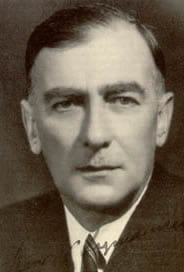
 Grzegorz Fitelberg, great Polish composer and conductor, is known to have conducted nearly all premieres of the compositions of the late great composer Karol Szymanowski. According to one reliable source, author, biographer, historian and musicologist Leon Markiewicz, of Fitelberg’s foreign performances—176 of which were concerts containing Polish works and 121 concerts of exclusively Polish music—180 performances were of Szymanowski compositions, frequently a few in one concert program. These very impressive statistics confirm the diary of Fitelberg’s Syzamanowski performances.
Grzegorz Fitelberg, great Polish composer and conductor, is known to have conducted nearly all premieres of the compositions of the late great composer Karol Szymanowski. According to one reliable source, author, biographer, historian and musicologist Leon Markiewicz, of Fitelberg’s foreign performances—176 of which were concerts containing Polish works and 121 concerts of exclusively Polish music—180 performances were of Szymanowski compositions, frequently a few in one concert program. These very impressive statistics confirm the diary of Fitelberg’s Syzamanowski performances.
The famous composer Witold Lutosławski, whose own career was shaped by the maestro, formulated the following significant statement regarding Fitelberg:
One should realize that only thanks to Fitelberg’s activity Polish music of the last years became known in the world. One may even doubt if Karol Szymanowski’s creation would have worked the concert halls only thanks to the mere fact of publishing it by Universal Edition if it had it not been for the frequent and full of artistic skill and suggestiveness given by Fitelberg in a large number of concert halls in Europe and America.
Lutosławski was always prudent with praise and his remarks should not be taken lightly.
Several archival live broadcasts and sound recordings were made of Szymanowski’s compositions. Live broadcasts were made from the Polish National Radio Symphony Orchestra. These treasures survive today, including such Szymanowski classics as excerpts from the ballets Harnasie, Op. 55; the operetta Loteria na mężów; three fragments from the symphonic poem Jana Kasprowteza, Op. 5; several transcriptions from Op. 88 (including nr. 1 – “Lecioły zurazie,” nr. 3 – “Uwez Mano,” nr. 5 – “Apod Borem,” nr. 7 – “Sciani dumbeki,” nr. 8 “Lec glosie po rosie”); “Roxana’s Song” from Król Roger ; the Second Symphony, Op. 19; the 1st Violin Concerto, Op. 35; the 2nd Violin Concerto, Op. 61; Four Polish pieces for piano and the Nocturne and Tarantella.
On LP, mainly from MUZA Records, miraculous archival sound recordings are available of Szymanowski’s Second Symphony, Op. 19; Nocturne and Tarantella (with arrangement by G. Fitelberg), Op. 28; “Roxana’s Song” from the Opera Król Roger, Op. 46; 1 st Violin Concerto, Op. 35; 2nd Violin Concerto, Op. 61; and 4th Symphony for Piano and Orchestra, Op. 62. These provide us with a rare glimpse of Szymanowski recordings not presently available to the public. One hopes and prays that in this year “The Year of Szymanowski” that the powers that be find a way to see that this is a golden opportunity to release a Szymanowski-Fitelberg CD of the sound recordings of these two colleagues and composers who shared together a common bond and love of music.
[If you would like to read part I of Mr. Fitelberg’s article, “Fitelberg & Szymanowski,” please see the April 2007 Newsletter.]
Fitelberg International Competition For Conductors
The 8th Grzegorz Fitelberg International Competition for Conductors will be held November 16-25, 2007 in Katowice, Poland. This competition takes place every four years. Participation is limited to individuals 35 years of age and under at the opening of the competition. Cash
prizes, medals and other special prizes are awarded to 1st, 2nd, 3rd place winners and honorable mentions.
After the Chopin Piano Competition in Warsaw and Wieniawski Violin Competition, the Fitelberg Competition is the third most important and largest music competition in Poland . This very prestigious competition is recognized by the World Federation of Music Competitions in Geneva.
Grzegorz Fitelberg (1879-1953), legendary composer and conductor, was internationally known as the “Ambassador of Polish Music.” The life of this maestro was dedicated to promoting and propagating Polish art, culture, and music worldwide. Fitelberg began his career by founding a group of composers consisting of Szymanowski, Karłowicz, Rozycki and Szeluto, known as “Young Poland” [Młoda Polska]. His composing career was cut short in order to champion the compositions of his colleague Szymanowski. As a conductor, some of the greatest orchestras of Fitelberg’s time were under his baton, including the Warsaw Philharmonic Orchestra, Vienna Opera, Imperial Opera and Bolshoi Ballets, Ballets Russes, and the Polish National Radio Symphony Orchestra.
On the occasion of the 100th anniversary of Fitelberg’s birthday in 1979, Karol Stryja created and organized the first five Fitelberg Competitions, as a special tribute to his life-long mentor. Stryja was succeeded by author, biographer, historian and musicologist Leon Markiewicz. Markiewicz has since contributed to the repertoire of scholarly works and to the oeuvre of studies about Fitelberg, including a biography, Grzegorz Fitelberg (1879-1953) – Życie i Dzieło; a brief English excerpt and monograph, Grzegorz Fitelberg 1879-1953. The Great Polish Conductor; as well as a collection and compendium of correspondence, Grzegorz Fitelberg Korrespondecja. These works shed a bright light on the personal and professional life of the maestro.
On the occasion of the 50th anniversary of his death in 2003, and in conjunction with the 7th Grzegorz Fitelberg International Competition for Conductors, an archival CD sound recording was released of the maestro conducting the works of Polish composers Moniuszko, Noskowski, Fitelberg, Karłowicz, Lutosławski, and especially of Szymanowski. This award-winning CD won the prestigous Frederyk Award (the Polish equivalent to the American Grammy Award) for classical music.
This year, the 8th Grzegorz Fitelberg International Competition for Conductors will pay special tribute to the “Ambassador of Polish Music” by continuing his legacy of the promotion and propagation of Polish culture and international friendship throughout the world. For further information about the competition and for an application, or obtain news and rules you can contact the competition office as follows:
SIEDZIBA KONKURSU
Filharmonia Śląska w Katowicach
ul. Sokolska 2
40-084 Katowice
POLAND
tel./ fax.: +48 32 258 98 85; +48 32 351 17 18; or +48 32 351 17 10
tel.: +48 32 350 21 80
E-mail: konkurs@filharmoniaslaska.art.pl or biuroprogramowe@filharmoniaslaska.art.pl
Website: http://www.konkursfitelberg.art.pl
News
Moniuszko—Polish Patriot & Musician
 June 4th marks the 135th anniversary of Stanisław Moniuszko’s death. Together with Frederic Chopin, he is one of the most important composers in the history of Polish music in the nineteenth century. While Chopin wrote mainly for the piano, Moniuszko is primarily remembered for his vocal music. Both composers were ardent patriots, proudly drawing on the rich heritage of Polish musical traditions, an important factor given the precarious political condition of Poland during the partitions. Most of Chopin’s deeply innovative Mazurkas and majestically moving Polonaises were written during the years of his Parisian exile. Drawing on the same national traditions, Moniuszko’s compositions were written in Poland with a desire to keep the patriotic flame alive during the difficult years of struggle for independence.
June 4th marks the 135th anniversary of Stanisław Moniuszko’s death. Together with Frederic Chopin, he is one of the most important composers in the history of Polish music in the nineteenth century. While Chopin wrote mainly for the piano, Moniuszko is primarily remembered for his vocal music. Both composers were ardent patriots, proudly drawing on the rich heritage of Polish musical traditions, an important factor given the precarious political condition of Poland during the partitions. Most of Chopin’s deeply innovative Mazurkas and majestically moving Polonaises were written during the years of his Parisian exile. Drawing on the same national traditions, Moniuszko’s compositions were written in Poland with a desire to keep the patriotic flame alive during the difficult years of struggle for independence.
Stanisław Moniuszko was born on May 5, 1819, in Ubiel, and came from a deeply patriotic family of landowners in Eastern Poland. Moniuszko’s early years were spent in nearby Minsk, now the capital of Belarus. His talent for music manifested itself early with a few early piano Mazurkas that Moniuszko dedicated to his future wife. In 1837 he went to study composition in Berlin. Only a year later a few of his songs for voice and piano were published there and Moniuszko’s career was launched.
Back in Poland in 1840, Moniuszko moved to Wilno (Vilna is the capital of Lithuania today), where he held the post of organist and music director at the church of St. John. His proximity during this time to one of the most important religious monuments in Poland, Wilno’s miraculous Madonna of Ostra Brama, account for a great number of religious works in Moniuszko’s catalogue. These include Litanie ostrobramskie [The Ostra Brama Litanies], seven masses, and numerous other smaller choral and solo works.
Moniuszko’s contact with the literary circles of Wilno and Warsaw—especially through friendships with Józef Ignacy Kraszewski, Aleksander Fredro, and the folk-song-collector Oskar Kolberg —awakened his interest in drama and the richness of Polish folklore. These links eventually led Moniuszko to become the preeminent composer of Polish national operas.
One of his best-known operatic works, Halka, is a story of a simple girl who is seduced and abandoned by a magnate. First given in a concert version in Wilno in 1848, it was quickly repeated in St. Petersburg, alongside the orchestral overture Bajka [A Fairy Tale], and the cantata, Milda. The success of these performances led Moniuszko to substantially revise and expand Halka’s score. The premiere of Halka’s new version in Warsaw on 1 January 1858 established Moniuszko’s reputation not only in Poland’s capital, but also throughout Central Europe, as the opera was performed in Prague, Moscow, and St. Petersburg.
Encouraged by his stage triumphs, Moniuszko moved his family to Warsaw in 1859. His incredible string of operas began in 1858 with Flis [The Raftsman ] and Hrabina [The Countess] written in 1859. These two exceptional works were followed by Verbum nobilein 1860 and Straszny dwór [The Haunted Manor] in 1865. All of Moniuszko’s operas depict the special realm of the Polish countryside, populated by the landed gentry and peasants, and portrayed with great deal of wit and charm as well as pride. All of Moniuszko’s operas instantly entered the national repertory and have stayed there ever since. Several of the ballet interludes incorporate Poland ‘s most cherished dances, like the Polonaise, Mazurka, Oberek, and Kujawiak. The “Grand Mazurka” from the Haunted Manor became an immediate hit and it remains so to this day.
Moniuszko must also be remembered for his music for voice and piano. He wrote over 350 songs, garnering the sobriquet of the Polish Schubert in many circles. Collected under an unassuming title Śpewniki domowe [Songbooks for home use], they were designed to serve amateur musicians far and wide. Simple and direct, they show Moniuszko’s great melodic gifts and highlight the achievements of the best known Polish poets, including Mickiewicz, Kraszewski, Lenartowicz, and Syrokomla. At a time when Polish language and literature were eliminated from schools and public life by the governments of Russia or Germany that administered partitioned Poland, Moniuszko’s songs kept the national literature alive though his unforgettable musical settings. Moniuszko can also be credited for introducing his audiences to excellent contemporary translations of poems by Shakespeare, Goethe and Hugo, among others, which he used to excellent effect in several dozen of his songs. Among the great many of Moniuszko’s most treasured achievements, Pieśń wieczorna[The Evening Song], Znasz-li ten kraj [Do You Know the Land], Kozak [The Cossack], and Prząśniczka [The Spinning-Wheel Maiden] continue to exercise their magic spell upon the successive generations of music lovers.
[MZ]
Chairman Of Composer’s Union Chosen
 Jerzy Kornowicz has been re-elected as the chairman of Polish Composer’s Union [ZKP]. He has held the position since 2003, and before that time he served as member of the board and chairman of the ZKP’s “Circle of Young Composers.” Kornowicz will be joined by the following board members: Krzysztof Knittel, Lidia Zielińska, Mieczysław Kominek, Alicja Matracka-Kościelny, Zbigniew Bargielski, Krzysztof Droba, Zbigniew Bagiński, Andrzej Chodkowski, Andrzej Dziadek, Zbigniew Kozub, Maciej Małecki and Maciej Zieliński.
Jerzy Kornowicz has been re-elected as the chairman of Polish Composer’s Union [ZKP]. He has held the position since 2003, and before that time he served as member of the board and chairman of the ZKP’s “Circle of Young Composers.” Kornowicz will be joined by the following board members: Krzysztof Knittel, Lidia Zielińska, Mieczysław Kominek, Alicja Matracka-Kościelny, Zbigniew Bargielski, Krzysztof Droba, Zbigniew Bagiński, Andrzej Chodkowski, Andrzej Dziadek, Zbigniew Kozub, Maciej Małecki and Maciej Zieliński.
Kornowicz studied composition in Warsaw and the Hague (Netherlands). He has been commissioned to write music for the Warsaw Autumn Festival, BBC Radio and Polish Radio. He was a stipend winner from the government of Holland, the Polish Cultural Foundation and the British Council. For more information about the composer you can visit www.polmic.pl
PIASA Annual Meeting
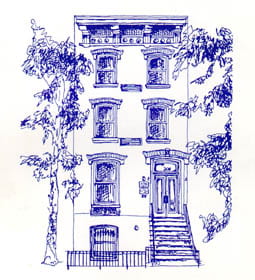 The 65th Annual Meeting of the Polish Institute of Arts & Sciences of America (PIASA) is scheduled for June 15-16, 2007 at Georgetown University in Washington, D.C. The Annual Meetings are in essence multi-disciplinary conferences focusing on Polish and Polish-American themes. A schedule of the Meeting’s events is available at: www.piasa.org/P%20R%20O%20G%20R%20A%20M.pdf.
The 65th Annual Meeting of the Polish Institute of Arts & Sciences of America (PIASA) is scheduled for June 15-16, 2007 at Georgetown University in Washington, D.C. The Annual Meetings are in essence multi-disciplinary conferences focusing on Polish and Polish-American themes. A schedule of the Meeting’s events is available at: www.piasa.org/P%20R%20O%20G%20R%20A%20M.pdf.
Chopin: BBC Composer Of The Month
 In the May 2007 issue of BBC Music Magazine, writer Jessica Duchen explores “Fryderyk Chopin: the Master of Darkness” in her Composer of the Month article of the same title (p. 40-43). Duchen calls Chopin “a mass of paradoxes and contradictions.” Although a performer by trade, Chopin much preferred to improvise by himself or for a few friends – “The music he wrote down is simply a trace of what his sometimes exquisite, sometimes terrifying imagination could conjure up in [improvisation].” And yet, the music that flowed through Chopin’s fingers was never tossed off. “Chopin’s construction is meticulous, the proportions near perfect, the magical enharmonic shifts part and parcel of the musical intellect… In Chopin’s hands Bachian counterpoint, Bellini-esque melody and the sense of improvisation fuse to unlikely perfection.” Dark emotions under the surface combined with a charming parlor aesthetic, paralleled by the multiple musical genres which he emulated—these extremes are what make Chopin’s music unlike that of any other composer. To order the whole article, visit www.bbcmusicmagazine.com.
In the May 2007 issue of BBC Music Magazine, writer Jessica Duchen explores “Fryderyk Chopin: the Master of Darkness” in her Composer of the Month article of the same title (p. 40-43). Duchen calls Chopin “a mass of paradoxes and contradictions.” Although a performer by trade, Chopin much preferred to improvise by himself or for a few friends – “The music he wrote down is simply a trace of what his sometimes exquisite, sometimes terrifying imagination could conjure up in [improvisation].” And yet, the music that flowed through Chopin’s fingers was never tossed off. “Chopin’s construction is meticulous, the proportions near perfect, the magical enharmonic shifts part and parcel of the musical intellect… In Chopin’s hands Bachian counterpoint, Bellini-esque melody and the sense of improvisation fuse to unlikely perfection.” Dark emotions under the surface combined with a charming parlor aesthetic, paralleled by the multiple musical genres which he emulated—these extremes are what make Chopin’s music unlike that of any other composer. To order the whole article, visit www.bbcmusicmagazine.com.
2 Premieres For Skrzypczak
 The successful premiere of anomalia Lunae media by Bettina Skrzypczak took place in Basel, Switzerland on April 20, 2007, and was performed by Sylvia Nopper (soprano), Bjoern Waag (baritone) and the Collegium Novum Zurich, conducted by Ruediger Bohn. This piece was composed for the 300th birthday of the famous mathematician, physicist, astronomer and music theorist Leonhard Euler. The title refers to Euler’s treatise about the orbit of the moon and texts of the piece were selected by the composer from the writings of Euler, Leonardo da Vinci, Boethius and Jorge Luis Borges. The piece is written for soprano, baritone and 15 instrumentalists divided into three groups.
The successful premiere of anomalia Lunae media by Bettina Skrzypczak took place in Basel, Switzerland on April 20, 2007, and was performed by Sylvia Nopper (soprano), Bjoern Waag (baritone) and the Collegium Novum Zurich, conducted by Ruediger Bohn. This piece was composed for the 300th birthday of the famous mathematician, physicist, astronomer and music theorist Leonhard Euler. The title refers to Euler’s treatise about the orbit of the moon and texts of the piece were selected by the composer from the writings of Euler, Leonardo da Vinci, Boethius and Jorge Luis Borges. The piece is written for soprano, baritone and 15 instrumentalists divided into three groups.
Then, on May 13, 2007, the premiere of Initial for orchestra, also by Skrzypczak, was performed by the Orchestre de Chambre de Lausanne during the “Les amplitudes” Festival in French Swiss city of La Chaux-de-Fonds. Marco Angius was the conductor. Instrumentation for this piece consists of double winds, strings and percussion. The concert also included works by Salvatore Sciarrino and W.A. Mozart, and was broadcast live by Radio Suisse Romande, Espace 2.
Radio Free Europe Broadcasts At PIASA
Just before its closing in 1994, the New York Office of Radio Free Europe/Radio Liberty on 1775 Broadway, contacted Dr. Thaddeus V. Gromada, Executive Director of the Polish Institute of Arts & Sciences of America (PIASA) and offered to deposit close to 300 large reel-to-reel audio tapes containing radio broadcasts to Poland. The offer made by Albert Arkus, RFE’s Broadcast Operations Director, was immediately accepted and arrangements for a speedy transfer were made by PIASA’s director and his deputy Jane Kedron.
Unfortunately these reel-to-reel tapes were not catalogued and they were so fragile and brittle that for all practical purposes were not accessible to researchers. Recently, however, these conditions have been dramatically changed as a result of an agreement that was made between Poland ‘s National Archives (Naczelna Dyrekcja Archiwow Panstwowych) in Warsaw and PIASA in New York. The audio tapes were sent to the National Archives in Warsaw for deposit. In return the Poland’s National Archives using the technological capabilities of its “Archiwum Dokumentacji Mechanicznej” performed the formidable and labor intensive task of cataloging the contents of the tapes and then transferring them electronically onto Compact Discs. Thus a large proportion of radio broadcast produced by Radio Free Europe New York Office between 1956 to 1989 are now conveniently available to researchers studying the Cold War period. Over 600 radio broadcasts to Poland have been identified and can now be easily heard at PIASA’s Sound Archives, located at 208 East 30th St. in New York City. These CD’s include, among others, interviews with such notables as Czesław Miłosz, Adam Ulam, Artur Rubinstein, Stanisław Skrowaczewski, Henryk Grynberg, etc.; lectures by Leszek Kolakowski, Piotr Wandycz, Stanisław Baranczak, Wacław Jedrzejewicz, Jerzy Lerski, Zbigniew Brzeziński, Feliks Gross, etc.; and coverage of important events like the Papal visits to the U.S., PIASA’s Congresses, Polonia programs, etc. A complete listing of the broadcasts will be made available on PIASA’s website, www.piasa.org.
Each year PIASA has the services of a Visiting Research Archivist from Poland made possible by the cooperation and support of Poland ‘s National Archives and the Kosciuszko Foundation. This year Krzysztof Porolniczak, from the Gdańsk State Archives serves as the Visiting Research Archivist. For more information, email: piasany@verizon.net.
[Information for this article taken from www.piasa.org/news.html]
Kilar’s New Soundtrack
 One of the most important living Polish composers has returned to writing film soundtracks. The most recent movie with Wojciech Kilar’s music is entitled We Own the Night and has just premiered at the Cannes Film Festival. The movie was directed by James Gray and stars Joaquin Phoenix, Mark Wahlberg, Eva Mendes and Robert Duvall. The movie was entered into the main competition and is vying for the Golden Palm. It will premiere in the U.S. in September 2007.
One of the most important living Polish composers has returned to writing film soundtracks. The most recent movie with Wojciech Kilar’s music is entitled We Own the Night and has just premiered at the Cannes Film Festival. The movie was directed by James Gray and stars Joaquin Phoenix, Mark Wahlberg, Eva Mendes and Robert Duvall. The movie was entered into the main competition and is vying for the Golden Palm. It will premiere in the U.S. in September 2007.
Lutosphere
 This concert brings together three artists who come from three rather distinct musical milieu: Leszek Możdżer – jazz piano, Andrzej Bauer – cello, and D. J. m. Bunio. S. They are brought together by the music of Witold Lutosławski, an uncompromising artist, and the author of his own personal musical idiom. One may wonder whether the successful collaboration of an improvisational jazz artist, a virtuoso classicist and an avant-garde DJ is at all possible. Can musicians with such utterly different artistic experiences find common ground? The evening of Sunday June 24th at 7:00 p.m. promises to answer this question with an exciting and controversial evening of music. The concert will take place at Cadogan Hall on 5 Sloane Terrace in London. More details are available here: www.polishculture.org.uk/EVENTS_2007/lutosphere.html
This concert brings together three artists who come from three rather distinct musical milieu: Leszek Możdżer – jazz piano, Andrzej Bauer – cello, and D. J. m. Bunio. S. They are brought together by the music of Witold Lutosławski, an uncompromising artist, and the author of his own personal musical idiom. One may wonder whether the successful collaboration of an improvisational jazz artist, a virtuoso classicist and an avant-garde DJ is at all possible. Can musicians with such utterly different artistic experiences find common ground? The evening of Sunday June 24th at 7:00 p.m. promises to answer this question with an exciting and controversial evening of music. The concert will take place at Cadogan Hall on 5 Sloane Terrace in London. More details are available here: www.polishculture.org.uk/EVENTS_2007/lutosphere.html
Kraków Philharmonic News
PWM Editor-in-Chief Andrzej Kosowski and conductor Gabriel Chmura are the top candidates for the directors of the Kraków Philharmonic. If chosen they would start immediately after the summer holiday. Andrzej Kosowski has proven himself to be an excellent manager at PWM and Gabriel Chmura is an internationally acclaimed conductor, currently with NOSPR. Both candidates are considered without an official competition for the positions. Both candidates agree that for the new arrangements to fully work the orchestra has to be restructured, better financed and supported by local officials. There also must be a significant raise in wages: “…Your musicians need to finally earn decent money, only than we can expect anything from them…” said Chmura. Later in June there will be a meeting between candidates and officials and hopefully the institution will start the season under new management. Since October 2005, the orchestra has not had full time management. Temporary positions have been filled by Jacek Berwaldt and Jan Krenz.
Zhyslin Masterclasses For Young Artists
The European Penderecki Centre for Music, under the media auspices of Polish Radio and Telewizja Polska, have organized a MEETING of the 20th-century MASTER with YOUNG ARTISTS of the 21st century. Maestro Grigori Zhyslin will present i nterpretation of chamber and solo compositions for the violin and viola to 10 qualified young participants. The masterclasses will be held between 8 – 17 June 2007 at the Palace of Małachowscy in the health resort of Nałęczów. All participation costs other than board will be subsidized by the Polish Ministry of Culture and National Heritage.
The aim of these masterclasses is to discuss and teach the interpretation of chamber and solo pieces in different epochs including contemporary music. This will be accomplished through talks with outstanding scholars and performers. For more information, visit the official website of the Krzysztof Penderecki European Music Centre, www.eucemusic.org.
Warszynski Performs In Alberta
Mikolaj Warszynski – June 3, 7 pm. Convocation Hall, University of Alberta. Works by Beethoven, Liszt, Chopin, and Symanowski. Admission by donation, in support of Warszynski’s studies at Université de Montreal.
The Warszynski Trio – June 16, 8 pm. Convocation Hall, University of Alberta. Works by G. Andrix, S. Chatman, S. Godin, R. Hannah, M. Horwood, M. K. Pishny-Floyd, J. Sobieraj.
Pianist Mikolaj Warszynski was born in Gdańsk, Poland and immigrated to Canada at the age of four. His early teachers include Barbara Ellis and Janet Scott Hoyt. Mikolaj graduated from the University of Alberta in June 2000 and was awarded a Bachelor of Music degree with Distinction in piano performance as well as the Richard Eaton Scholarship in Music. While at the UofA, he studied with the late Marek Jablonski, continuing further with the late Ernesto Lejano and Ayako Tsuruta. In the summer of 1997 and 1998, Mikolaj studied at the Mozarteum International Summer Academy in Salzburg, Austria, on scholarship from the Johann Strauss Foundation, and in the summer following, attended the Aspen Summer Music Festival and School. Mikolaj made his debut with the Edmonton Symphony Orchestra in January, 1999, performing Ludwig van Beethoven’s 3rd Piano Concerto. In September 2004, Mikolaj graduated with distinction from the Conservatory of Music in Rotterdam in the Netherlands, after being invited by his professor Aquiles Delle Vigne, with whom he had studied at the Mozarteum Summer Academy in Salzburg. Mikolaj was awarded a Sauter grand piano on loan from the National Instrument Foundation in Amsterdam and has been heard frequently as a soloist and chamber musician across the Netherlands. In September 2005 Mikolaj entered a M.Mus. program at the Université de Montréal. In September 2007, Mikolaj starts his residency at Banff Centre.
The Warszynski Trio (Tatiana Warszynski and Joanna Ciapka Sangster, violins; Mikolaj Warszynski, piano – pictured above) was founded to commission and play Canadian and international works for two violins and piano, or any combination of these three instruments – from solo to trio. Over the years the trio members have commissioned, premièred and/or given performances of works by a host of Canadian and foreign composers. They have presented those works at the Edmonton and Saskatchewan New Music Festivals as well as at frequent recital appearances. Recent commissions include new pieces from Scott Godin (Montréal), George Andrix, Thom Golub, Piotr Grella-Mozejko and Jacek Sobieraj (all from Edmonton). The three musicians will be recording their first CD, devoted to Canadian New Music, in the Summer of 2007.
750 Years Of Kraków
 “Cracovia totius Poloniae urbs celeberrima” – in other words, “Kraków, the most famous city in all Poland.” This month, Kraków will solemnly celebrate the 750 th anniversary of the granting of the Magdeburg Rights in 2007. Naturally, this does not mean that Krakow was established only in the 13th Century. In fact, the city had already existed for a long time. If we are to believe the chroniclers, in around the year 700 Prince Krak, acting together with the shoemaker Skub (also known as Skuba) killed a dragon and founded Krakow. In the year 1257, the city was granted new rights. It was then that the Market Square and the network of streets within the Planty ring, which has survived until this day, were laid out. For more history of the city, visit www.krakow.pl
“Cracovia totius Poloniae urbs celeberrima” – in other words, “Kraków, the most famous city in all Poland.” This month, Kraków will solemnly celebrate the 750 th anniversary of the granting of the Magdeburg Rights in 2007. Naturally, this does not mean that Krakow was established only in the 13th Century. In fact, the city had already existed for a long time. If we are to believe the chroniclers, in around the year 700 Prince Krak, acting together with the shoemaker Skub (also known as Skuba) killed a dragon and founded Krakow. In the year 1257, the city was granted new rights. It was then that the Market Square and the network of streets within the Planty ring, which has survived until this day, were laid out. For more history of the city, visit www.krakow.pl
To celebrate this most momentous of anniversaries, the city is planning a week and a half of music, free and open to the public. The calendar of events is listed below.
“I Did Not Come To Win But To Play!”
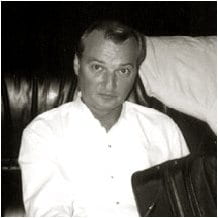 June 2007 marks the 37th anniversary of Polish-American violinist Vincent P. Skowronski representing the United States in the Fourth International Tchaikovsky Competition. The Soviet news agency TASS reported: “With Vincent Skowronski and Glenn Dichterow, we again hear different interpretations of J. S. Bach, beautiful sounds, good schooling and, quite understandably, different degrees of persuasiveness.” Read the entire Chicago Tribune recounting of the events at www.skowronskiplays.com/press/moscow2.html.
June 2007 marks the 37th anniversary of Polish-American violinist Vincent P. Skowronski representing the United States in the Fourth International Tchaikovsky Competition. The Soviet news agency TASS reported: “With Vincent Skowronski and Glenn Dichterow, we again hear different interpretations of J. S. Bach, beautiful sounds, good schooling and, quite understandably, different degrees of persuasiveness.” Read the entire Chicago Tribune recounting of the events at www.skowronskiplays.com/press/moscow2.html.
Blechacz Graduated
On May 16, Rafał Blechacz, winner of the 2005 Chopin Competition, performed his last recital and defended his thesis at the Bydgoszcz Music Academy. As a result he has received the equivalent of a Masters of Music [mgr] degree from the Feliks Nowowiejski Music Academy in Bydgoszcz, where he studied with Katarzyna Popowa-Zydroń. The program of his recital included 24 Preludes op. 28 by Frederic Chopin and Mozart’s Sonata for two pianos in D Major with Piotr Kępiński. After the recital Blechacz successfully defended his thesis on “Specifics of the artistic performance in competition, concert and phonographic aspects”. The near future plans of the pianist include a Japanese tournée with Russian National Orchestra. Also, the new CD with Blechacz’s performances will be released in the fall by Deutsche Grammophon. For more information about Rafał Blechacz please visit his official website.
Awards
Wrocław Honors Masur
 Kurt Masur, world renowned conductor, was awarded Honorary Citizenship of Wrocław, one of the highest honors given in the region. Masur was born in Brzeg Opolski in 1927 and attended music school in Wrocław between 1942-1944, which at the time was occupied by Germans. He renewed his Wrocław connection in the 1990s when he started his conducting masterclasses at the Wrocław Music Academy, from which he received an honorary doctorate. The official presentation of the honor will take place on June 24, 2007.
Kurt Masur, world renowned conductor, was awarded Honorary Citizenship of Wrocław, one of the highest honors given in the region. Masur was born in Brzeg Opolski in 1927 and attended music school in Wrocław between 1942-1944, which at the time was occupied by Germans. He renewed his Wrocław connection in the 1990s when he started his conducting masterclasses at the Wrocław Music Academy, from which he received an honorary doctorate. The official presentation of the honor will take place on June 24, 2007.
Górecki & Stuligrosz Honored
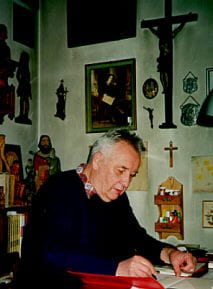
Henryk Mikołaj Górecki, composer (pictured at left in his studio), and Stefan Stuligrosz, conductor, are this year’s recipients of theJerzy Kurczewski Award. The award is meant to honor artists devoted to choral music, especially conductors and composers. It was established in 1999 and is the only award of this type in Poland. Since its conception the award was given to Jan Łukaszewski, Włodzimierz Siedlik, father Stanisław Adamczyk, Prof. Andrzej Koszewski, Anna Szostak and Prof. Henryk Wojnarowski. The committee, headed by Krzysztof Meyer, agreed unanimously on this year’s laureates, since their artistic input in the field of choral music is unquestionable.
Jerzy Kurczewski was a composer and a conductor, in 1945 he created one of the most widely known Polish choirs, “Polskie Słowiki” [Polish Nightingales] boys choir, which has performed over 2200 concerts all around the world and trained over 1000 young singers. Currently the choir performs under the name of “Poznań Boys Choir.”
Gloria Artis For Skrowaczewski

Stanisław Skrowaczewski has received the Gloria Artis medal from the Polish vice-minister of culture, Jarosław Sellin. The medal was given to the esteemed conductor on May 18, during a concert with the National Philharmonic where he conducted Beethoven, Messiaen and Strauss.
Stanisław Skrowaczewski was born in Lwów and studied music from the
age of 4. He was a prodigy pianist and composer, but a wartime hand injury prevented him from continuing his career as soloist. After the war he held numerous conducting posts in Polish symphony orchestras including Wrocław Philharmonic, Silesian Philharmonic in Katowice, Kraków Philharmonic and National Philharmonic in Warsaw. In 1956 he won an international conducting competition in Rome, which opened up international concert opportunities for him. Since 1960 he has lived in the United States, and is a long time musical director of Minnesota Symphony and guest conductor of Saarländischer Rundfunk Orchestra. In 2007 Skrowaczewski starts his two year tenure as Principal Conductor of the Yomiuri Nippon Symphony Orchestra in Tokyo.
For more information about Stanisław Skrowaczewski please visit www.intermusica.co.uk.
Urbański Wins In Prague
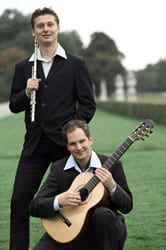 Polish conductor, Krzysztof Urbański, has won the International Conducting Competition, held as a part of 62nd Prague Spring Music Festival. The second place went to Marzena Diakun, also from Poland and the third to Koji Kawamoto from Japan . The winners were chosen from among some 30 international applicants.
Polish conductor, Krzysztof Urbański, has won the International Conducting Competition, held as a part of 62nd Prague Spring Music Festival. The second place went to Marzena Diakun, also from Poland and the third to Koji Kawamoto from Japan . The winners were chosen from among some 30 international applicants.
These international music competitions are a mainstay of Prague Spring Festival since1947. The fields/instruments of competition change every year. To find out more about the Prague Spring Festival and Competition or to learn about past laureates please visit the official website, festival.cz.
Kaczka Wins In Italy
Polish flautist Krzysztof Kaczka has won the first prize and a Gold Medal at the XVII Interantional Competition for the Young Soloists “Citta di Barletta” in Italy. Krzysztof Kaczka is also a member of duoArtus (with Perry Schack on guitar, pictured at left), which has won the first prize, Gold Medal and special honorary mention at the International Chamber Music Competition “Citta di Barletta”.
In the near future Acte Prealable will release a CD recorded by Kaczka with Esti Rofe and Anna Kijanowska. For more information about the artists please visit the official website of the duet.
Honorary Doctorates In Warsaw
Two outstanding Polish musicians and educators have received Honoris Causa Doctorates from the Frederic Chopin Music Academy in Warsaw: Joachim Grubich and Andrzej Jasiński.
Joachim Grubich is an organist, a soloist who has performed in 25 countries worldwide and whose recording won a Fryderyk award in 2004. He is currently a professor at the Warsaw and Kraków Music Academies.
Andrzej Jasiński is a pianist and has performed all around the world. His acclaimed pupils include Krystian Zimmerman and Krzysztof Jabłoński. He has served as a juror of the International Chopin Piano Competition seven times including two chairman honors. He has performed master classes and workshops around the world and is a teacher at the “Mozarteum” Summer Music Academy in Salzburg.
Ada Sari Competition Results
 The 14th International Ada Sari Vocal Art Competition and 12th International Vocal Festival has attracted 80 singers from 12 countries. This competition takes place in Nowy Sącz and is designed for female voices under 30 years of age and no more than 32 years of age for male vocalists.
The 14th International Ada Sari Vocal Art Competition and 12th International Vocal Festival has attracted 80 singers from 12 countries. This competition takes place in Nowy Sącz and is designed for female voices under 30 years of age and no more than 32 years of age for male vocalists.
This year’s winners in the female voice category are:
- 1st prize – Anna Simińska (soprano)
- 2nd prize – Kamila Kułakowska (soprano)
- 3rd prize – Rena Fujii (soprano)
In the male voice category the winners are:
- 1st prize – Stanisław Kierner (bass/baritone)
- 2nd prize – Jarosław Kitala (baritone)
- 3rd prize – Patryk Rymanowski (bass/baritone)
Polish singer Ada Sari (Jadwiga Szayer; 1886-1968) was a coloratura soprano, actress and teacher. She has performed on the most important stages around the world, including La Scala and Carnegie Hall.
For complete listing and photos of singers honored by the jury please visit the results website.
Culture Foundation Awards
The Kraków chapter of the Polish Cultural Foundation has announced the recipients of the honorary awards. This year there are three laureates: Teresa Chylińska, who is one of the foremost specialist musicologists dedicated to life and music of Karol Szymanowski; the poet Ewa Lipska; and Stanisław Radwan, a composer mostly known for his music composed for theater plays, especially in the “Old Theater”.
Calendar Of Events
 June 1: 9:10 p.m. – 11 p.m. – Main Market Square, Kraków. Inaugural jubilee concert – “In love with Kraków” cantata premiere. Piotr Rubik – music, Zbigniew Książek – libretto.
June 1: 9:10 p.m. – 11 p.m. – Main Market Square, Kraków. Inaugural jubilee concert – “In love with Kraków” cantata premiere. Piotr Rubik – music, Zbigniew Książek – libretto.
June 2: 7 p.m. – 9.30 p.m. – Main Market Square, Kraków. Wielki Turniej Kabaretowy “Kraków kontra Reszta świata”.
June 3: 9 p.m. – 10.30 p.m. – Main Market Square, Kraków. Jazz Night – the “Classic and Contemporary” concert by Tomasz Stańko
June 4: 9 p.m. – 10.30 p.m. – Main Market Square, Kraków. “Krakow Artists for the City of Kraków”
June 5: 9 p.m. – 10.30 p.m. – Main Market Square “Cracovia Est” Oratorio by Dariusz Regucki
June 6: 10 p.m. – 11 p.m. – Main Market Square, Kraków. Sinfonietta Night – Gustav Holst´s The Planets suite by Gustav Holst, for female choir and orchestra; lyrics by Zbigniew Herbert, Michał Rusinek, and Grzegorz Turnau; Music by Grzegorz Turnau.
June 7: 9 p.m. – 11 p.m. – Main Market Square, Kraków. Special oratory concert: The Song on Hidden God by Ennio Morricone. Ennio Morricone – conductor, Susanna Rigacci – soprano, Roberto Abbondanza – baritone, Roma Sinfonietta.
June 8: 7 p.m. – 10 p.m. – Multikino Kraków. 128 Dobrego Pasterza Street, Kraków. IDA 2007 Polish DJ Championship.
June 9: 8 p.m. – 9 p.m. – Main Market Square, Kraków. The “Kraków Through Centuries” – performance by the Cracovia Danza Court Ballet. A show of fashion from the Middle Ages to the present day (first night).
June 10: 10 p.m. – 10.15 p.m. – Main Market Square, Kraków. “Campanae Cracovienses” – concert of Kraków church bells by Marek Stachowski
June 3: Karolina Naziemiec, violist, is proforming with the Los Angeles Philharmonic and Los Angeles Master Chorale. The first concert in the “L.A. is the World” concert series. 7:00 p.m. Walt Disney Hall, Los Angeles, CA.
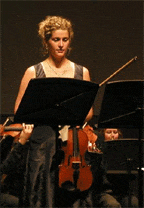 June 3: Mikolaj Warszynski plays works by Beethoven, Liszt, Chopin, and Symanowski. Admission by donation, in support of Warszynski’s studies at Université de Montreal. 7 pm. Convocation Hall, University of Alberta, Canada.
June 3: Mikolaj Warszynski plays works by Beethoven, Liszt, Chopin, and Symanowski. Admission by donation, in support of Warszynski’s studies at Université de Montreal. 7 pm. Convocation Hall, University of Alberta, Canada.
June 7: Karolina Naziemiec, violist, is proforming with the Los Angeles Philharmonic and Los Angeles Master Chorale. The first concert in the “L.A. is the World” concert series. 8:00 p.m. Walt Disney Hall, Los Angeles, CA.
June 9: Juliana Gondek sings the mezzo-soprano solo for the World Premiere of Magnificat/Prayer of Hannah by Paul Chihara. With the Young Musicians Foundation Debut Orchestra, Donald Neuen conducting. Aso on the program: How Lovely Thy Dwellings & Nänie – Johannes Brahms and Flos Campi – Ralph Vaughan Williams, with Paul Coletti, Viola. 8:00 pm. UCLA Royce Hall, Los Angeles, CA . Information: 310-825-4761. Tickets: www.tickets.ucla.edu.
June 12: Maurizio Pollini Recital of Chopin and Liszt.7:30 p.m. Barbican Hall, London, UK.
 June 12: Rymanowski Brothers present a dance picnic. 3:00 p.m. Albany Polish Community Center, Albany, NY.
June 12: Rymanowski Brothers present a dance picnic. 3:00 p.m. Albany Polish Community Center, Albany, NY.
June 15-16: 65th Annual Meeting of the Polish Institute of Arts & Sciences of America (PIASA). Georgetown University, Washington, D.C.www.piasa.org/P%20R%20O%20G%20R%20A%20M.pdf.
June 16: The Warszynski Trio performs works by G. Andrix, S. Chatman, S. Godin, R. Hannah, M. Horwood, M. K. Pishny-Floyd, J. Sobieraj. 8 pm. Convocation Hall, University of Alberta, Canada.
June 24: Leszek Możdżer– jazz piano, Andrzej Bauer – cello, and D. J. m. Bunio. S perform the music of Witold Lutosławski. 7:00 p.m. Cadogan Hall (5 Sloane Terrace) London, UK. polishculture.org.uk/EVENTS_2007/lutosphere.html.
Festivals
Gaude Mater Festival
 The “Gaude Mater” International Festival of Sacred Music will take place in Częstochowa between May 1 and 6. This annual festival is one of the more important musical events in Poland. The organizers expect almost 800 performers from around the world. The program includes concerts of Flemish, Armian and Argentinean music as well as sacred flamenco songs and baroque music from the Jasna Góra vault. The festival will be opened with a performance of Mendelssohn’s 2nd Symphony and will close with Brahms’ Ein deutsches Requiem. A special place during the festival is reserved for Polish music—there will be multiple concerts, including premiere performances of works by Paweł Sydor, Krzesimir Dębski, Sławomir Czarnecki, Marcin Kopczyński, Zbigniew Kozub and Henryk Mikołaj Górecki. During the festival an awards ceremony will also be held for the winners of the International Composition Competition “Musica Sacra.” All festival events will take place inside churches and concert venues around Częstochowa. More details and a complete schedule of events are available in English and Polish at www.gaudemater.pl
The “Gaude Mater” International Festival of Sacred Music will take place in Częstochowa between May 1 and 6. This annual festival is one of the more important musical events in Poland. The organizers expect almost 800 performers from around the world. The program includes concerts of Flemish, Armian and Argentinean music as well as sacred flamenco songs and baroque music from the Jasna Góra vault. The festival will be opened with a performance of Mendelssohn’s 2nd Symphony and will close with Brahms’ Ein deutsches Requiem. A special place during the festival is reserved for Polish music—there will be multiple concerts, including premiere performances of works by Paweł Sydor, Krzesimir Dębski, Sławomir Czarnecki, Marcin Kopczyński, Zbigniew Kozub and Henryk Mikołaj Górecki. During the festival an awards ceremony will also be held for the winners of the International Composition Competition “Musica Sacra.” All festival events will take place inside churches and concert venues around Częstochowa. More details and a complete schedule of events are available in English and Polish at www.gaudemater.pl
Musica Electronica Nova Festival
 The second edition of this festival will take place in Wrocław between May 18 and 26. The festival is dedicated to music created or aided by the most contemporary technological advancements: computers, samples, software, etc. It is geared towards young audiences but also towards all listeners looking for a new musical experience. This year’s edition includes such names as: Arditti Quartet, Anssi Kartunnen, Camilla Hoitenga, Garth Knox, Alter Ego, Andrzej Bauer, and the Aukso Chamber Orchestra conducted by Marek Moś. Also from a different genre of electronic music: Scanner, Pan Sonic, Kazuhisa Uchihashi, and, praised for the visual production of artistic events, D-Fuse group. The honorary guest this year is one of the most renowned Finnish living composers, Kaija Saariaho; this festival marks the first time that her art will be presented in Poland.
The second edition of this festival will take place in Wrocław between May 18 and 26. The festival is dedicated to music created or aided by the most contemporary technological advancements: computers, samples, software, etc. It is geared towards young audiences but also towards all listeners looking for a new musical experience. This year’s edition includes such names as: Arditti Quartet, Anssi Kartunnen, Camilla Hoitenga, Garth Knox, Alter Ego, Andrzej Bauer, and the Aukso Chamber Orchestra conducted by Marek Moś. Also from a different genre of electronic music: Scanner, Pan Sonic, Kazuhisa Uchihashi, and, praised for the visual production of artistic events, D-Fuse group. The honorary guest this year is one of the most renowned Finnish living composers, Kaija Saariaho; this festival marks the first time that her art will be presented in Poland.
For more information about the festival and for the detailed calendar of events please visit the official website of the festival, www.musican.aprom.pl/electronica.html
Warsaw Music Meetings
The 21st edition of the Warsaw Music Meetings will be held between May 5 and 13. The festival is organized by ZKP [Polish Composer’s Union] with the help of Polish Radio Channel 2, the Mazovian Culture Centre and the Warsaw Royal Castle. The festival is financed by the City of Warsaw, the Ministry of Culture and ZAIKS. The festival has been organized by the Warsaw chapter of ZKP since 1986 and focuses on classical music, both old and new. For the program of this year’s edition please visit the ZKP website.
Probaltica Festival
The 14th edition of the festival dedicated to music of the Baltic countries was opened on May 1 with the concert version of Ludomir Różycki’s opera, Bolesław Śmiały. In celebration of the Szymanowski year, the European Symphony Orchestra (combined chamber groups from Latvia, Lithuania, Sweden and Poland) will perform his works. Also scheduled to perform are: Latvian Chamber Orchestra from Liepaj, Novogrod Philharmonic Chamber Orchestra, Lithuanian National Symphony Orchestra from Wilno, Gotlands Blasarkvintett and Visby Jazz Trio from Sweden, Finnish organist Dann Lonquist, Avanti Chamber Ensemble from Finland and Tresafinato from Denmark. Poland will be represented by laureate of the recent Wieniawski competition, Anna Maria Staśkiewicz, the Sinfonietta Cracovia with Krzysztof Penderecki and the National Philharmonic with Antoni Wit. The festival will continue until May 27. For information about festival please visit the official website, www.probaltica.art.pl
Polish Fest
 Polish Fest is one of the largest and most popular of the festivals that happen almost every weekend in Milwaukee, WI during the summer. It is a festival celebrating all things Polish, including food, music, dance, arts, culture, geography/geneology, etc… For many years, Polish Fest has included a Chopin Youth Competition for aspiring young classical musicicans. This year the festival will take place from June 22-24. For more information, please visit www.polishfest.org.
Polish Fest is one of the largest and most popular of the festivals that happen almost every weekend in Milwaukee, WI during the summer. It is a festival celebrating all things Polish, including food, music, dance, arts, culture, geography/geneology, etc… For many years, Polish Fest has included a Chopin Youth Competition for aspiring young classical musicicans. This year the festival will take place from June 22-24. For more information, please visit www.polishfest.org.
Discography
New on DUX
 Alberto Ginastera: Complete Works for Piano
Alberto Ginastera: Complete Works for Piano
Andrzej Pikul, piano
DUX 0552/0553 (2 CD set)
 Szymanowski: Phantasy | Masques | Harnasie
Szymanowski: Phantasy | Masques | Harnasie
Karol Szymanowski: Fantasy in C Major, Op. 14; Masques. 3 Poems for piano, Op. 34; Harnasie, Op. 55
Joanna Domańska & Andrzej Tatarski, piano
DUX 0576
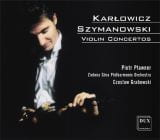 Karłowicz/Szymanowski – Violin Concertos
Karłowicz/Szymanowski – Violin Concertos
Mieczysław Karłowicz: Violin Concerto in A major Op. 8; Karol Szymanowski: Violin Concerto No. 1 Op. 35
Piotr Pławner, violin; Zielona Góra Philharmonic Symphony and Chamber orchestras; Czesław Grabowski, conductor
DUX 0540
Although this recording was already included in our September ’06 Discography, we would like to include it again here to highlight the review in the American Record Guide . Editor Donald R. Vroon comments that, of the 12 Szymanowski and 4 Karłowicz recordings of these pieces that have been reviewed by the magazine, “Piotr Plawner must be one of the best in both lists…If you don’t have the Karłowicz, do get either this recording or the Hyperion .” (May/June 2007, p. 116-117)
Chopin on CD
 Chopin: Impromptus; Polonaises
Chopin: Impromptus; Polonaises
Frederic Chopin: 4 Polonaises; 4 Impromptus
Evgeny Kissin, piano
RCA 68668
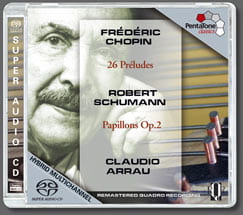 Frédéric Chopin: Complete Preludes
Frédéric Chopin: Complete Preludes
Frederic Chopin: 24 Preludes; Robert Schumann: Papillons
Claudio Arrau, piano
PTC 5186 165
 Chopin Waltzes
Chopin Waltzes
Frederic Chopin: 19 Waltzes, 4 Scherzos
Eugene Mursky, piano
PH04066
Guitar Music
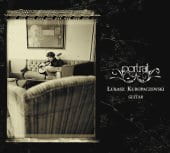 Łukasz Kuropaczewski Portrait
Łukasz Kuropaczewski Portrait
Johann Sebastian Bach – Prelude, Fuge and Allegro, BWV998; Alexander Tansmann – Hommage à Chopin ; M. Giuliani – Rossiniana, Op. 121 No. 3
Łukasz Kuropaczewski, guitar
CD Accord ACD140
Regarding his first recording, American Record Guide reviewer Kenneth Keaton says this: “Lukasz Kuropaczewski is a major talent, but one hopes that he can rein in his raw energy.” (May/June 2007, p.194) Keaton seems only marginally impressed with this debut, but with great expectations for the future.
Performances
Anweiler at CCSU
NEW BRITAIN – May 4, 2007 – Internationally acclaimed pianist Andrzej Anweiler performed in the Alex and Regina Rudewicz Polish Music Series at Central Connecticut State University on Tuesday, May 15, at 7 p.m. in Founder’s Hall. “Andrzej Anweiler has gained international acclaim as a pianist of unique style, elegance and technical brilliance. He has appeared as soloist with orchestras and in recital to enthusiastic reviews and has made numerous recordings for radio and television both in Europe and the United States,” noted Dr. M.B. Biskupski, holder of the Stanislaus A. Blejwas Endowed Chair of Polish and Polish American Studies at CCSU.
Anweiler is a graduate of the Hartt School of Music and the Manhattan School of Music in New York, where he received his Master’s degree. He has studied under the well-known pianists Daniel Pollack and Robert Goldsand. A winner of many prizes and awards, Anweiler was the sole American recipient of the Zelosky Grant, awarded jointly by the Kosciuszko Foundation and the Polish Government, for post-graduate study at the Warsaw Conservatory with Regina Smendzianka. He later continued his studies with Prof. George Rogers of the Royal Academy of Music in London.
He has appeared in concert at Wigmore Hall and the Commonwealth Institute in London, the Musikverein in Vienna, Beethovenssaal in Berlin, Ostrogski Palace (Chopin Society) and Philharmonic Hall in Warsaw, Carnegie Recital Hall, the Kosciuszko Foundation Gallery and the Yale Center for British Art.
Dr. Alex M. and Mrs. Regina Rudewicz endowed the Rudewicz Polish Music Series. Dr. Rudewicz, a dentist with a practice in Weatogue, comes from a musical family. Dr. and Mrs. Rudewicz are active in Polish American cultural organizations and Dr. Rudewicz is on the Board of the Polish National Home and serves on CCSU’s Polish Studies Advisory Committee. “CCSU is deeply grateful for the endowment of this annual program, as music is among the richest elements of Polish national culture,” said Professor Biskupski. “Polish music spans from Chopin’s polonaises and mazurkas, to folk music, to such contemporary composers as Krzystof Penderecki and Henryk Gorecki.”
[This press release was repeated from the CCSU website, www.ccsu.edu]
Akademos At Carnegie
 The Akademos Quartet was chosen to perform in conjunction with the Emerson String Quartet, as a part of this year’s Carnegie Hall “Perspectives” series on this 30 year anniversary of the Emerson String Quartet. They will be participating in the Master Class on Thursday, May 17, 2007 at 7:00 p.m. and the Young Artists Concert on Wednesday/ Thursday, May 23 – 24 at 7:30 p.m., as a part of the Emerson String Quartet’s Professional Training Workshop. The Akademos Quartet as well as the two other invited quartets (Le Musiche Quartet from Herbert von Karajan Academy – Berliner Philharmoniker and the Vinca Quartet from Yale and Columbia Universities), have received The Weill Music Institute stipend, making it possible for the young artists to participate.
The Akademos Quartet was chosen to perform in conjunction with the Emerson String Quartet, as a part of this year’s Carnegie Hall “Perspectives” series on this 30 year anniversary of the Emerson String Quartet. They will be participating in the Master Class on Thursday, May 17, 2007 at 7:00 p.m. and the Young Artists Concert on Wednesday/ Thursday, May 23 – 24 at 7:30 p.m., as a part of the Emerson String Quartet’s Professional Training Workshop. The Akademos Quartet as well as the two other invited quartets (Le Musiche Quartet from Herbert von Karajan Academy – Berliner Philharmoniker and the Vinca Quartet from Yale and Columbia Universities), have received The Weill Music Institute stipend, making it possible for the young artists to participate.
Now in its eighth season, Carnegie Hall’s Perspectives series is an artistic initiative in which select musicians are invited to explore their own musical individuality and create their own personal concert series through collaborations with other musicians and ensembles. The goal of the Emerson String Quartet’s 8-concert contribution to this series is to delve into the complete Beethoven string quartets, discussing their central presence in the string quartet repertoire and their impact on composers over the last two centuries. Other artists presenting Perspectives during the 2006–2007 season are Thomas Quasthoff, David Byrne, and Pierre-Laurent Aimard. Previous Perspectives artists have included conductor and pianist Daniel Barenboim; conductors Pierre Boulez, James Levine, Michael Tilson Thomas, and David Robertson; violinist Gidon Kremer; cellist Yo-Yo Ma; pianists Martha Argerich, Emanuel Ax, Maurizio Pollini, Peter Serkin, Mitsuko Uchida, and Leif Ove Andsnes; soprano Dawn Upshaw; Senegalese vocalist Youssou N’Dour; and Brazilian singer-songwriter Caetano Veloso.
The Akademos Quartet was founded in 1997 by graduates of the Karol Szymanowski Academy of Music in Katowice. Since its inception, the Quartet has been praised for its members’ technical maturity, brilliance, and professionalism as well as for their novelty, vigor, and enthusiasm. Its current members are Anna Rechlewicz (violin), Joanna Cogiel (violin), Aleksandra Batog (viola) and Danuta Sobik-Ptok (cello). In its 10-year-long career, the ensemble has given over three hundred concerts in Poland and abroad, performed at national and international festivals and music competitions, and won numerous prizes and distinctions. They have performed in musical centers of Austria, the Czech Republic, Germany, Lithuania, Slovakia, Romania, the United Kingdom, Italy, and the United States.
[Information for this article was gathered from: www.carnegiehall.org/article/press/press_release/105768.html, www.polishculture-nyc.org, and http://www.culture.pl/pl/culture/artykuly/wy_in_koncert_akademos_carnegie_hall.]
Chamber Orch. Revived with Polish Music
The Milwaukee Chamber Orchestra, which had to shut down their operations in 2005 for more than two years because of financial difficulty, was revived on May 12th during a free concert at Calvary Presbyterian Church in Milwaukee, WI. This concert was made possible by the tireless work of Richard Hynson, who was designated music director last June, and a volunteer board of directors led by David Carter, as well as financial support from Polanki, the Polish Women’s Cultural Club of Milwaukee. Hopefully, this suggests great things for the future of this ensemble.
Their revival concert was full of Polish composers. The program included G. Bacewicz’s Concerto for String Orchestra and H.M. Górecki’s Three Pieces in the Old Style, as well as Nancy Bloomer’s Peninsula Suite and P.I. Tchaikowsky’s Serenade for Strings.
[Information for this article was taken from “Revived chamber orchestra will perform,” Milwaukee Journal Sentinal (May11, 2007) by Tom Strini]
Motion Trio At Skirball
 Originally scheduled as a double bill, the May 31st performance was instead a full-length concert by Motion Trio. Bester Quartet (formerly known as Cracow Klezmer Band) did not perform. The concert was a part of the Skirball Center’s Compressing The World series. This concert series showcasing the accordion across diverse cultures and musical styles was inspired by a 1930s “hand harmonica” brought to America by a Jewish teenager fleeing Nazi Germany. This object is on view in the Skirball’s core exhibition, “Visions and Values: Jewish Life from Antiquity to America.” This event was presented in association with the Polish Cultural Institute.
Originally scheduled as a double bill, the May 31st performance was instead a full-length concert by Motion Trio. Bester Quartet (formerly known as Cracow Klezmer Band) did not perform. The concert was a part of the Skirball Center’s Compressing The World series. This concert series showcasing the accordion across diverse cultures and musical styles was inspired by a 1930s “hand harmonica” brought to America by a Jewish teenager fleeing Nazi Germany. This object is on view in the Skirball’s core exhibition, “Visions and Values: Jewish Life from Antiquity to America.” This event was presented in association with the Polish Cultural Institute.
Poland ‘s Motion Trio uses the accordion in surprising new ways and draws inspiration from classical, jazz, rock, and techno music. In addition to their own compositions, they will perform the world premiere arrangement—for three accordions—of “De Profundis,” a movement from Polish composer Krzysztof Penderecki’s Seven Gates of Jerusalem, a work commissioned by the Israeli government.
[GF]
Dobber Triumphant In Scotland
 A new production of Verdi’s opera Macbeth has been created for the 2007 Glyndebourne Festival of opera. Reviewer Rupert Christiansen of London ‘s Daily Telegraph calls the production, “brilliantly imaginative and impeccably executed production.” The titular protagonist of this provocative staging is Polish baritone Andrzej Dobber, whom Christiansen says is “an imposing Macbeth, singing with secure tone and a clean line.” Performances will run through July 21, 2007. For more information about the opera, see www.glyndebourne.com. To read the entire Daily Telegraph review, go to http://www.telegraph.co.uk/arts/main.jhtml?xml=/arts/2007/05/21/btmacbeth121.xml
A new production of Verdi’s opera Macbeth has been created for the 2007 Glyndebourne Festival of opera. Reviewer Rupert Christiansen of London ‘s Daily Telegraph calls the production, “brilliantly imaginative and impeccably executed production.” The titular protagonist of this provocative staging is Polish baritone Andrzej Dobber, whom Christiansen says is “an imposing Macbeth, singing with secure tone and a clean line.” Performances will run through July 21, 2007. For more information about the opera, see www.glyndebourne.com. To read the entire Daily Telegraph review, go to http://www.telegraph.co.uk/arts/main.jhtml?xml=/arts/2007/05/21/btmacbeth121.xml
Chamber Music At KF
Polish virtuoso Krystian Tkaczewski was the featured soloist in Chopin’s Piano Concerto No. 2 in F minor on Sunday, May 20 at 3 PM at the Kosciuszko Foundation. He was accompanied by the Connecticut Virtuosi Chamber Orchestra, under the direction of Adrian Sylveen.
Violinist, conductor, chamber musician and educator, Andrian Sylveen Mackiewicz is currently an artistic director of the Connecticut Virtuosi Chamber Orchestra, Connecticut Lyric Opera, Eastern Connecticut Symphony Youth Orchestra, and the New Britain Chorale.
A graduate of the Paderewski Music Academy in Poznań, Poland and the Yale University School of Music in New Haven, CT, he began his musical education at the age of five. He has been awarded several prestigious government scholarships and awards including “Primus Inter Pares” Award given by the President of the Republic of Poland, and Ministry of Education scholarship. Very active as chamber musician and soloist, Mr. Mackiewicz frequently performs and collaborates in concerts and recitals and lectures on various musical topics at several regional colleges. His repertoire includes, among many other works, a large number of works by twentieth century Polish composers. In 2004, Mr. Mackiewicz was granted the “Extraordinary Abilities in the Arts” permanent US residence, as one of a small percentage of those who have risen to the top in their field of endeavor.
Mr. Mackiewicz founded the Connecticut Virtuosi Chamber Orchestra in 1997. The Connecticut Virtuosi Chamber Orchestra is a professional orchestra from the Greater Hartford/New Britain area dedicated to presenting both traditional and contemporary classical chamber works. The orchestra was established in 1997 under the auspices of the Polish American Foundation. Special attention is given to music from Eastern Europe. The group is a frequent guest at the Kosciuszko Foundation’s Chamber Music Series.
Krystian Tkaczewski, born in 1980 in Tarnów, Poland, started his musical education at the Paderewski Music School there and continued at the Chopin Academy in Warsaw. Since 2005 Krystian has been a graduate student of Oxana Yablonskaya at the University of Hartford Hartt School of Music as a Hartt Talent Award Holder. He had his debut at Carnegie Hall in April 2007. He has taken part in many competitions and festivals around the world and has concertized on three continents.
Obituary
Adam Falkiewicz
Adam Falkiewicz, a young and promising Polish composer, died on 21 May 2007. He was 27 years old. Born in Warsaw on 4 January 1980, Falkiewicz attended music schools in Warsaw and was tutored privately in composition by Włodzimierz Kotoński during the years 1996-1999. From 1999-2003 Falkiewicz studied composition with Louis Andriesssen, Diderik Wagenaar and Gilius van Bergejk at The Royal Conservatory in The Hague, Netherlands. After graduating, Falkiewicz worked for a year as an assistant at the famed IRCAM at Centre Pompidou in Paris. In 2001, Falkiewicz collaborated with Luciano Berio and Louis Andriessen on a special European Union commission for a work based on Bach’s Kunst der Fuge and for the 2003-2004 season he was artist-in-residence at the Contemporary Art Center in Warsaw. Adam Falkiewicz was a recipient of many awards, including First Prizes at the Tadeusz Baird Young Composers’ Competition (1995), the Adam Didur Composers’ Competition (1996), and the Ryszard Bukowski Composers’ Competition (1997). He also wrote music for theatre and film.
Anniversaries
Born This Month
- June 1, 1909 – Maria DZIEWULSKA, composer and theoretician (d. 2006)
- June 4, 1845 – Aleksander POLIŃSKI, music historian (d. 1916)
- June 4, 1784 – Adam CZARNOCKI, music ethnographer (d. 1825)
- June 5, 1865 – Felicjan SZOPSKI, composer and music critic (d. 1939)
- June 6, 1929 – Bogusław SCHAEFFER, composer, writer
- June 12, 1897 – Aleksander TANSMAN, composer and pianist,
- June 16, 1923 – Henryk CZYŻ, conductor and composer
- June 17, 1930 – Romuald TWARDOWSKI, composer
- June 28, 1895 – Kazimierz SIKORSKI, composer and teacher
- June 28, 1904 – Włodzimierz POŹNIAK, musicologist
Died This Month
- June 1, 1869 – Jozef DULEBA, pianist and participant of January Uprising, died in a duel (b. 1843)
- June 3, 1904 – Daniel FILLEBORN, singer and performer of main parts in Moniuszko’s operas (b. 1841)
- June 4, 1872 – Stanislaw MONIUSZKO, Father of Polish National opera (b. 5 May 1819)
- June 5, 1964 – Henryk SZTOMPKA, pianist, Chopin specialist, teacher
- June 9, 1932 – Natalia JANOTHA, pianist and composer, student of Clara Wieck-Schumann, Royal Pianist in London, 400 opus numbers (b. 1856)
- June 10, 1953 – Grzegorz FITELBERG, conductor, composer, great promoter of new music, esp. Szymanowski (b. 1879)
- June 28, 1938 – Ludwik DRZEWIECKI, pianist and father of Zbigniew Drzewiecki
- June 29, 1945 – Kazimierz GARBUSINSKI, pianist, organist, composer
- June 30, 1957 – Michal SWIERZYNSKI, composer and choral conductor
